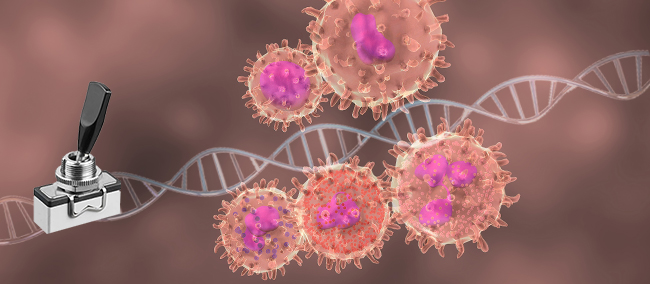
Keeping the body healthy – that’s the immune system’s job. And a healthy immune system allows our body to defend against invading disease-causing microorganisms like viruses, parasites, and bacteria.
One remarkable component of the immune system response is hematopoiesis, the process by which immune cells are produced in the bone marrow. During an infection, the hematopoietic system kicks into high gear, replenishing the immune cells that are quickly being consumed. Like a “state of emergency” for the body, this system is automatically triggered to increase blood stem cell production to fight back against attacking pathogens.
Now, new research finds that the “switch” that turns the hematopoietic system from normal production to emergency mode is epigenetically powered. In a study conducted at the German Cancer Research Center (Deutsches Krebsforschungszentrum, DKFZ), scientists demonstrated the existence of a tunable epigenetic state that sets off increased hematopoiesis to enhance innate immune protection. Published in Science Immunology, the results may help identify potential pathways for improving the body’s own natural defenses.
During the normal state of hematopoiesis, stem cells known as hematopoietic stem cells (HSCs) generate and differentiate into various types of mature blood cells (BC), including white blood cells, red blood cells, and platelets. Because BCs cannot self-proliferate, they are short-lived. Therefore, hematopoiesis is in a constant state of balancing all BC production to maintain homeostasis.
Emergency hematopoiesis response is characterized by a boost in HSC division, which favors the production of more white blood cells, specifically macrophages and granulocytes, that can rid the body of foreign invaders. This uptick in production is typically activated by the presence of the pathogen or by certain pro-inflammatory messenger molecules such as interferons.
In the current study, Nikolaus Dietlein and Hans-Reimer Rodewald of DKFZ and their team sought to determine more about how the hematopoietic system switches from normal to emergency mode. They decided to target a specific epigenetic modification called mono-ubiquitinated histone H2B (H2Bub1), which regulates the gene expression of interferon and can be removed by the enzyme USP22.
Previous articles have discussed the role of histone modifications in the blood and how these proteins can affect DNA structure and thus gene expression. Like other epigenetic mechanisms, histone modifications can be dynamically added or removed by specific enzymes. Of the various known histone modifications, methylation, acetylation, phosphorylation, and ubiquitylation are the most well-characterized.
Using a mouse model genetically lacking USP22 in the blood stem cells, the team found that the emergency program of hematopoiesis ran continuously, even without an infection or elevated interferon response. And when tested after exposure to listeria bacteria, the modified mice proved to be more proficient at fighting off the pathogen. In addition, their white blood cells, called neutrophil granulocytes, showed an improvement in capturing and destroying the invading bacteria.
Unsurprisingly, the USP22-deficient mice also had more epigenetic modifier H2Bub1 in their blood. In normal mice, the USP22 enzyme catalyzes the removal of this histone modification and, therefore, can shut down the emergency alert.
“The increased H2Bub1 level seems to be the alarm button that puts the immune system on standby,” said Dietlein. “In particular, this puts the innate immune defense, which is especially important during initial contact with a pathogen, into heightened defense alert.”
Humans also carry the H2Bub1 and USP22 components in their blood, and these elements function similarly. But it should be noted that the immune system’s complexity can make it challenging to predict human immune response based on animal studies.
“In mice, we were able to show that an epigenetic modification improves the defense against infection,” explains Rodewald, “However, how the loss of USP22 affects human hematopoietic stem and progenitor cells is still unknown and should now be investigated. Inhibition of USP22 by drugs could possibly one day help to improve the immune defense against pathogens. So far, however, this is currently still unproven and needs to be tested in further studies.”
Source: Nikolaus Dietlein, et al. Usp22 is an intracellular regulator of systemic emergency hematopoiesis. Science Immunology, 2022, 7(78).
Reference: Koh. Epigenetic emergency switch improves defense against infections. German Cancer Research Center (Deutsches Krebsforschungszentrum, DKFZ). December 9, 2022.

